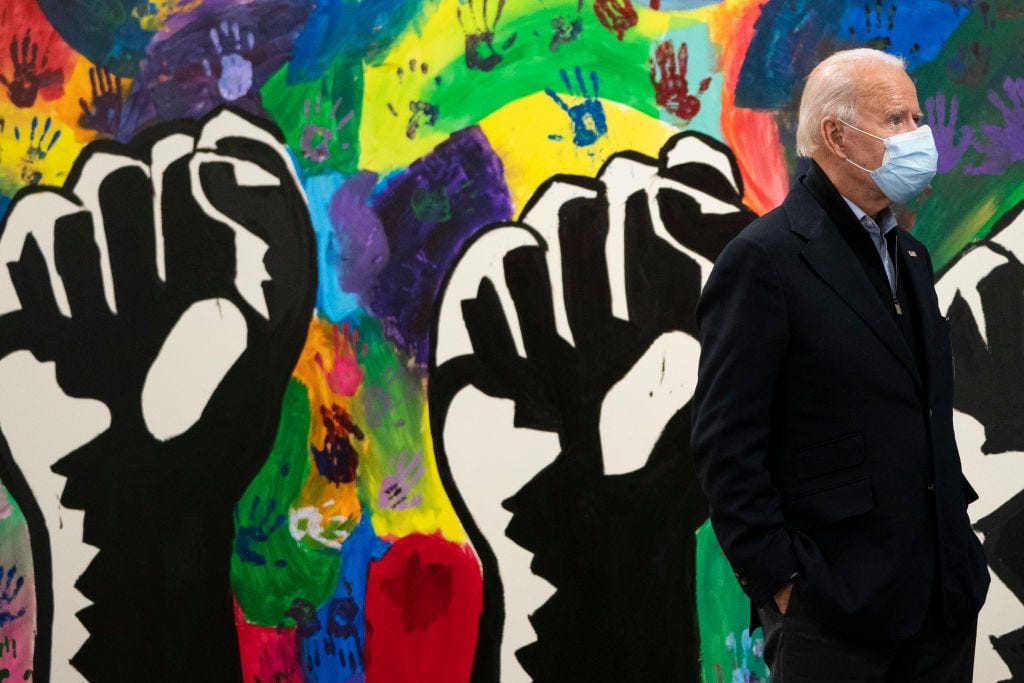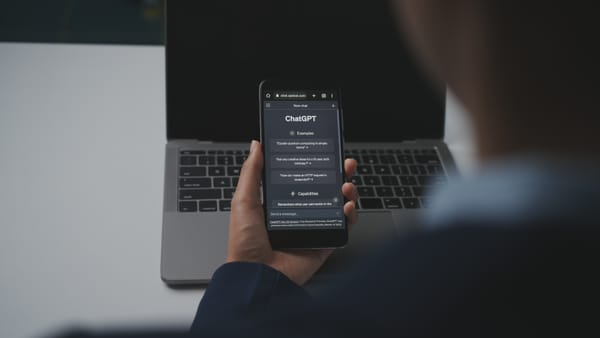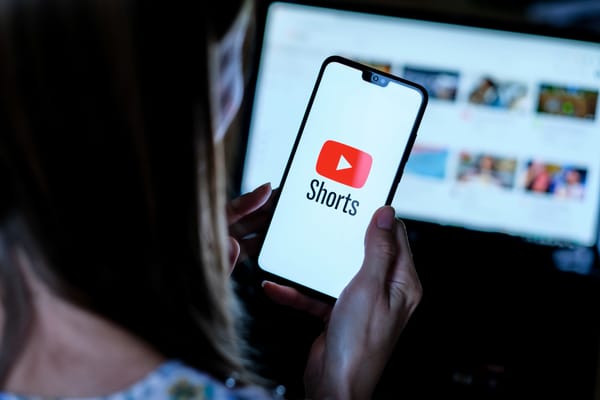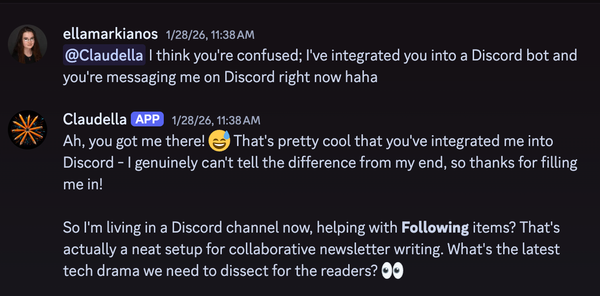The platforms hold their breath
Election Day went mostly OK. What now?

How do you you write a column about a nation holding its breath?
Writing in the early evening of Tuesday, November 3 feels like doodling on an ellipsis. What happened before today matters. What happens next matters much more. What’s happening now is that everyone is pacing back and forth wondering what reality we’re going to wake up in tomorrow.
It’s hard to overstate how radically the past four years have remade public opinion about the technology industry and its intersection with the wider world. But one statistic that landed Monday night captured just how stark that shift has been. It comes from an October survey of Facebook’s 49,000 full-time employees around the world. Here are Ryan Mac and Craig Silverman at BuzzFeed:
Only 51% of respondents said they believed that Facebook was having a positive impact on the world, down 23 percentage points from the company's last survey in May and down 5.5 percentage points from the same period last year. In response to a question about the company’s leadership, only 56% of employees had a favorable response, compared to 76% in May and more than 60% last year.
Four years ago, more than 80 percent of employees at Facebook were confident in the company’s future, and nearly three-quarters believed the company was making the world a better place. But revelations that Russia had used the platform to conduct a sprawling influence operation, along a series of data privacy scandals, turned that confidence on its head.
By November 2018, the Wall Street Journal reported that just 53 percent of Facebook employees thought the company was making the world a better place. And while that number rose significantly in the spring, as employees took pride in Facebook’s aggressive response to COVID-19, a summer of content moderation controversies caused it to dip lower than before.
To some extent, I think you can take these numbers as a proxy for employees at Google, Twitter, and other platforms I often write about here. Those companies all recruited bright, talented people, incentivized them to build products that capture our attention, and let loose algorithms that discover and promote the content that keeps us coming back the most.
All those people lived through the past four years, too, and many have their concerns about how these products might have affected the world around them. You don’t have to believe that social networks single-handedly brought the Trump administration into being to worry that they played a crucial supporting role.
Which leads us to this moment — and, depending on how long the tabulation of ballots takes, it could be a long moment. But it strikes me that whether Donald Trump or Joe Biden wins, it will once again recast the fortunes of tech platforms in important and new ways.
If Trump is still president in 2021, social networks will likely retain their current reputations as the goats of the tech industry. Press scrutiny will continue to focus on the way they are used to promote misinformation, amplify extremism, and grow followings for right-wing movements.
If Biden wins, all that relaxes. The issues will still be real, but the stakes will be dramatically lower. If Trump leaves office, the philosophy that I’ve taken to calling “platform determinism” — the idea that if there’s a problem on a social network, the social network is the primary cause of that problem — will lose its primary avatar. The platforms will still be in for a rough 2021; the antitrust suits against Google and Facebook are taking shape, and Biden seems to have visceral antipathy toward Facebook in particular.
But those are questions of how industries ought to be regulated; they are not existential questions about the future of democracy in America. And so, should that world come into being, I imagine that morale at Facebook will rise — possibly by quite a lot. It will probably rise at YouTube and Twitter as well.
Should that world come into being, platforms may develop new blind spots. Misinformation and extremism deserve continued scrutiny no matter who is running the country. The quality of our information sphere is always at risk, and when it declines we all suffer. And so no matter what happens, the moment will still call for vigilance.
Anyway, I think about all these things as I pace back and forth.
Wondering what reality I’m going to wake up in tomorrow.
Holding my breath.
Election Day scorecard
By late afternoon Pacific time on Election Day, things seemed to be going … mostly pretty well for the platforms?
On the good side:
- Facebook and Twitter intervened relatively quickly to label yet another Trump tweet making baseless claims of voter fraud.
- Twitter also placed restrictions on a Trump campaign official’s tweet making unfounded claims about voter fraud in Philadelphia. And it removed some large accounts that it said had misrepresented themselves or violated its rules against hate speech.
- Facebook and Twitter also named the outlets on which they will rely to make final calls about who has won the election.
- Platforms have arguably done more to explain how they will handle a case in which Trump declares premature victory than the major cable news networks have done.
- While observers noted some spikes in misinformation today, bad actors seemed to favor robocalls, text messages, and other platforms that are now easier to exploit than the 2020-era social networks.
On the bad side:
- Due to a caching issue, some Instagram users saw a banner informing them that “tomorrow” is Election Day. A really bad unforced error there.
- A variety of misinformation spread online about the crucial battleground state of Pennsylvania.
- Right-wing misinformation spreading on WeChat groups attempted to intimidate Chinese-American voters into staying home and not voting.
- A variety of false claims got at least some traction on social networks; the New York Times kept a helpful running tally.
So what else? Just a few more things:
- After coming in for criticism over selling total homepage takeovers to President Trump on Election Day, YouTube said it would stop selling these “masthead” ads.
- “The campaigns for President Donald Trump and Joe Biden spent a combined $192.3 million on Facebook advertising in the first 10 months of 2020, with over a quarter of that coming in October alone.”
The Ratio
Today in news that could change public perception of the big tech companies
⬇️ Trending down: Some of the biggest liberal pages on Facebook had their reach throttled in the weeks leading up to the election after the company mistakenly applied strikes to their accounts. Administrators for Occupy Democrats, the Other 98%, and Being Liberal said their reach declined by as much as 70 percent from normal levels. (On the other hand, hyper-partisan pages more often post false or partially false stories and get fact-checked accordingly. On the other other hand, you don’t see this happening to, say, Dan Bongino or Ben Shapiro.) (Craig Silverman and Ryan Mac / BuzzFeed)
Governing
⭐ Changes to YouTube’s recommendation algorithm after the 2016 election resulted in the company promoting fewer videos from fringe conspiracy theorists. Instead, YouTube now aggressively promotes clips from Fox News, according to new research from ex-Google employee Guillaume Chaslot. Jack Nicas has the story in the New York Times:
In several analyses of YouTube’s recommendations on popular news and election videos over the past month, Fox News was consistently the most recommended channel, sometimes by a wide margin, according to data from Mr. Chaslot and Marc Faddoul, a researcher at the University of California, Berkeley.
The data also showed that the Fox News clips most frequently recommended by YouTube were from its pro-Trump prime-time shows that often attack Democrats and sometimes spread unreliable information about voter fraud and the coronavirus.
The exposure notification app powered by Google and Apple and used by the United Kingdom’s National Health Service failed to send notifications after being set up with the wrong thresholds. Yikes: “While the technology should have been recognising people as having been in close enough proximity for a transmission, it had instead recorded that they were too far away for the virus to be passed between them.” (Sky News)
A district court judge sided with Sonos in a patent dispute with Google, throwing out one of the patents at the center of the lawsuit. The companies are currently suing each other over patent infringement. (Janko Roettgers / Protocol)
Industry
⭐ I talked to Hot Pod’s Nick Quah about Spotify, Joe Rogan, and platforms’ evolution from infrastructure into publishers:
Casey Newton: I’ve seen this play out so many times before, and I feel like I’m watching the first act of a movie I’ve already seen. Now, the second act of that movie is: there will be more controversies about more podcasts, and then there will be a series of articles laying out the most problematic podcasts on Spotify and how much is being paid for each of them, and then there’s a continuous drumbeat of leaks from inside Spotify. Some employees quit, some employees write Medium posts about why they quit and how toxic the environment has become, and then Spotify comes out and says, “We hear you, we’re going to adopt some real community standards now, here are the new rules going forward.”
Of course, maybe that won’t happen. But right now, I don’t see a world in which it doesn’t.
⭐ Snapchat has begun displaying follower counts for its top creators, in a somewhat surprising reversal of its hey-we’re-just-for-friends stance on influencers. I wonder what Snap saw that led them to make this change. Ashley Carman has the story at The Verge:
Snapchat is now allowing creators to publicize how many subscribers they have. This is the first time Snapchat has given its users any sort of public-facing metric about their followings or audiences, and it represents a substantial change to the platform, as first reported by Tubefilter. In a statement to The Verge, a Snap spokesperson said: “We’ve listened to feedback from our creator community and many of them expressed interest in having the option to show that their community on Snapchat is growing,” which is why it’s making subscriber counts visible. Creators can decide to turn this feature on or off from their settings.
Bridgefy, an “offline” messaging app that became popular among activists in Nigeria and Thailand, added end-to-end encryption. The app works by sending messages over mesh networks created using Bluetooth, allowing it to escape government internet controls. (Mike Butcher / TechCrunch)
Rumble is an upstart video platform that has found favor with right-wing users. Conservative pundits like Dan Bongino are driving big traffic to the site, but the small team seems unprepared for the content moderation crises to come. (Craig Silverman / BuzzFeed)
Spotify is allowing artists to request promotion in users’ recommendations, in exchange for a lower share of royalty revenue. Payola is back, baby. (Sarah Perez / TechCrunch)
Marketing agencies are buying UK real estate to establish TikTok houses. After seeing huge success in the United States, creator mansions are now moving abroad. (Katharine Gemmell / Bloomberg)
TikTok reached a music licensing deal with Sony. Music is the lifeblood of the app, but ByteDance still has not reached long-term agreements with Warner or Universal, the two other big record labels. (Jacob Kastrenakes / The Verge)
Twitch’s annual conference takes place online for the first time next week. TwitchCon has been renamed GlitchCon and will presumably feature a variety of popular streamers streaming. (Bijan Stephen / The Verge)
Those good tweets
there will be people today who tell you it’s healthy to go on a walk. get some fresh air. step away from your phone. these people are liars. every second you spend online increases the odds your candidate will win.
— maxwell (@maxwellstrachan) 1:40 PM ∙ Nov 3, 2020
some new information has come out since you checked twitter 2 minutes ago and it has completely changed the race
— David Mack (@davidmackau) 2:09 AM ∙ Nov 3, 2020
election day feels like being at the airport at 7 am. someone's eating pizza. someone's having a beer. someone has straight-up made a bed on the floor. the rules do not exist!! u do u!!
— Taylor Trudon (@taylortrudon) 12:37 PM ∙ Nov 3, 2020
Anxiety index: the entire Ben and Jerry’s freezer at the grocery store is empty.
— Kevin Roose (@kevinroose) 2:33 AM ∙ Nov 3, 2020
2020
— Emmy Bengtson (@EmmyA2) 1:49 AM ∙ Nov 3, 2020
24 hours to go
I wanna be sedated
um SIR
— miko | croc daddy (@holamikoo) 5:20 PM ∙ Nov 3, 2020
Talk to me
Send me tips, comments, questions, and pictures of your I Voted stickers: casey@platformer.news.





